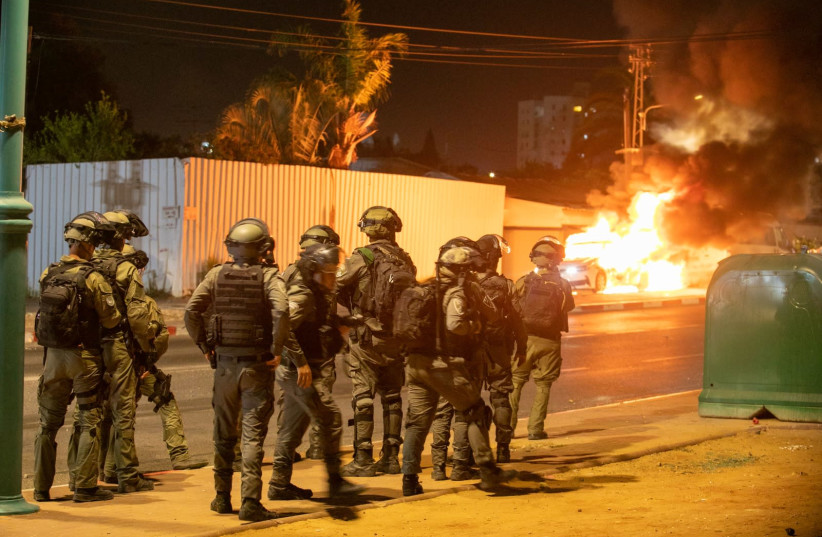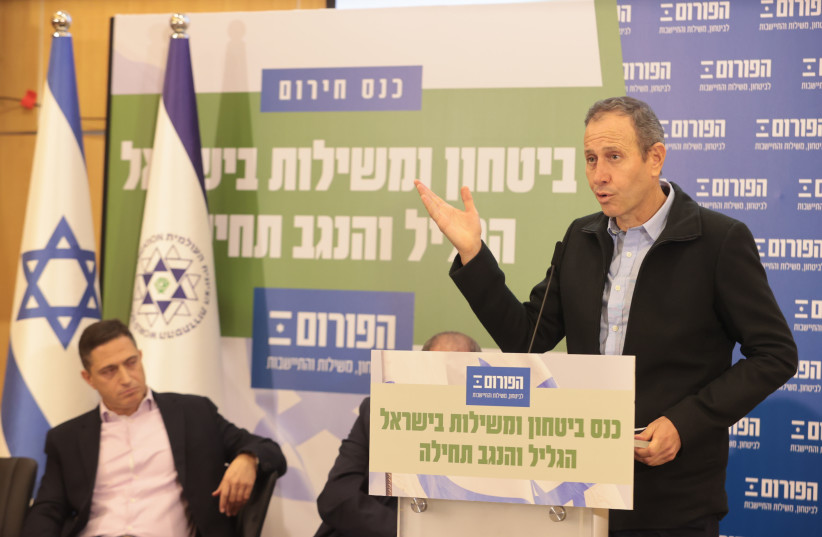The conference proposed an NIS 110 billion plan to fight crime and restore governance in the periphery.

The State of Israel is “on the brink of civil war” between Jews and Arabs, warned Acre Mayor Shimon Lankri during an emergency conference of the Forum for Security, Governance and Settlement on Sunday.
“A moment before we fall into a civil war, and I say this really after I was a witness to all the events of the May [2021, Operation Guardian of the Walls], the endpoint of the events of May will be the opening mark for the coming events,” said Lankri. “Whoever hasn’t understood it yet, we are on the brink of civil war in the State of Israel and not Haredim against secular Jews, but rather Arabs against Jews this is the next civil war. This will happen to us soon.”
Lankri called for governance to be restored in the Negev and Galilee stating “we need to do things that we haven’t done until today. We abandoned the area and it’s in our hands.”
Beersheba Mayor Ruvik Danilovich also spoke on Sunday, warning that just like rocket fire from the Gaza Strip, “civilian terror” would spread to the rest of the country. “It has no boundaries and no is waking up.”
IDF Maj.-Gen. (res.) and former MK Eyal Ben-Reuven stressed that the “greatest threat today on Israeli society is the threat from within. The threat on the personal security of the residents.”

Ben-Reuven warned that there was “serious neglect” concerning Jewish settlement in the Galilee and Negev. “A lack of demographic balance like this forms tensions and allows an excellent base of activity for extremist entities to incite these types of actions, nationalist activity.”
The former MK pointed to the riots that swept Israel during Operation Guardian of the Walls, stressing that while the IDF was fighting in the south, residents of the north were being instructed not to leave their homes after 5 p.m.
IDF Gen. (ret.) Israel Ziv called for urgent and substantial action to be taken concerning governance and demographic imbalance, warning that if this isn’t done “disintegrate the country into a state of national fragmentation, anarchy, which could even degenerate into a civil war.”
Ziv stated that “a decisive part of about twenty percent of Israel’s population (about one million seven hundred thousand people) are citizens with their ID, but not in their identity and commitment.”
Usfiya Regional Council head Behij Mansour warned that “if the state continues to exist in its current form, we are going to perish.”
“Start thinking differently otherwise we and you will not be here. The Druze are dealing with the issue of construction, and governance. They expropriated many dunams from the Druze. I don’t want to establish a Druze state, I want to have a planning horizon. I don’t want illegal construction,” said Mansour.
“There is no governance in the Druze population. Crime families begin to take over the Druze villages. Of the 90 Usafia shooting incidents, not a single one was deciphered. People go outside and are afraid they will get shot. The Israel Police has no manpower and cannot do anything.”
World Zionist Organization chairman Yaakov Hagoel addressed the conference as well, stressing the need to love your neighbor but to also have “zero tolerance for violence.”
Hagoel expressed hopes that the conference would produce recommendations that would increase the feeling of personal security for every citizen of Israel.
Conference proposes NIS 110 billion plan to fight crime, restore governance
The participants of the conference published a position paper providing a systemic plan to restore governance and fight crime throughout the country, demanding that the government adopt the plan. The proposal would cost at least NIS 110 billion over the next decade.
Part of the plan is to double the general population in the Galilee and Negev in the next ten years, adding about 1,750,000 people.
Earlier this month, Defense Minister Benny Gantz expressed concerns that violence in the West Bank could spread to mixed cities within Israel, similar to the riots that broke out in May 2021.
State Comptroller warns Arabs disadvantaged, police not ready for widespread violence
In July, the State Comptroller published a two-part report on mixed cities with one part dealing with the police’s conduct during Operation Guardian of the Walls and the second part dealing with municipal services for Arab residents in mixed cities.
The State Comptroller found “noticeable deficiencies” in the operations of law enforcement in mixed cities before and during the widespread violence that broke out during Operation Guardian of the Walls last year.
The report examined the operations of police in Lod, Jaffa and Acre during the riots. About 520 outbreaks of violence were reported throughout Israel during the operation, killing three, injuring hundreds and leading to about 3,200 arrests, including about 240 Jews. About NIS 48 million in damage was caused to civilian property and about NIS 10 million in damage was caused to police property.
“The violent riots during Operation Guardian of the Walls revealed significant deficiencies in the operations of the police and in the interface between police and the Shin Bet. These deficiencies severely harmed the most basic personal security that Israeli citizens are entitled to,” said the comptroller on Wednesday.
“These events brought to the surface existing tensions between the different population groups and testified to the need to take actions at the national and local level to create a respectful and common public space and to prevent the recurrence of such events. These events also illustrated the challenges of maintaining personal safety and ensuring public order in the cities involved and sharpened the need to examine the aspects of policing and law enforcement in these cities.”
The second part of the report found that Arab residents of mixed cities are heavily disadvantaged compared to their Jewish neighbors. The disparities were notable in education, budgets, municipal positions and property allocations.
The NGO Abraham Initiatives stressed that the two parts of the report are “two sides of the same coin.”
“As those who are intimately familiar with the reality in the mixed cities, we saw the gaps with our own eyes.
The Abraham Initiatives stressed that the situation of Arab residents in mixed cities is “immeasurably worse” than the situation of Jewish residents, adding that this may explain part of the causes of the severe tensions that erupted in the riots in May 2021. The NGO emphasized that national tension and the feeling of alienation of Arab citizens from the state may also be a factor in the tensions.
“The state must also pay attention to this matter, and we reinforce the state comptroller’s position that action must be taken to create a sense of belonging for the Palestinian citizens to the state,” said the NGO.
The failure of police to respond to the basic needs of Arab residents of mixed cities creates a “deep feeling of deprivation and alienation from the city” and their inability to respond during the riots deepened these feelings, leading them to “seek to take the law into their hands.”
The Abraham Initiatives called for the state to invest in police and for police to work intelligently and hand-in-hand with the communities in mixed cities. The organization added that further investments must be made to address severe gaps in mixed cities.
As reported by The Jerusalem Post
